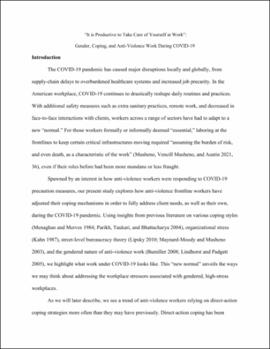| dc.contributor.author | Welch, Leigh | |
| dc.date.accessioned | 2022-01-04T15:38:39Z | |
| dc.date.available | 2022-01-04T15:38:39Z | |
| dc.date.issued | 2021-07-08 | |
| dc.identifier | oksd_welch2_HT_2021 | |
| dc.identifier.uri | https://hdl.handle.net/11244/332582 | |
| dc.description.abstract | After interviewing 23 anti-violence workers in Great Plains states using a semi-structured interview format, we discovered trends of coping mechanisms used by anti-violence workers during the COVID-19 pandemic. These coping mechanisms have shifted as the pandemic has altered workspaces, so workers have had to adjust accordingly. We found that previously utilized practices such as reliance on social support became more inaccessible while others became over utilized such as direct-coping and selective inattention. Additionally, we found an interesting trend on how workplace pace affected workers abilities to cope in ways that best benefitted them. | |
| dc.format | application/pdf | |
| dc.language | en_US | |
| dc.rights | Copyright is held by the author who has granted the Oklahoma State University Library the non-exclusive right to share this material in its institutional repository. Contact Digital Library Services at lib-dls@okstate.edu or 405-744-9161 for the permission policy on the use, reproduction or distribution of this material. | |
| dc.title | “It is productive to take care of yourself at work”: Gender, coping, and anti-violence work during COVID-19 | |
| osu.filename | oksd_welch2_HT_2021.pdf | |
| osu.accesstype | Open Access | |
| dc.type.genre | Honors Thesis | |
| dc.type.material | Text | |
| dc.contributor.director | Schwarz, Corinne | |
| dc.contributor.facultyreader | McLaughlin, Heather | |
| thesis.degree.discipline | Multidisciplinary Studies | |
| thesis.degree.grantor | Oklahoma State University | |
